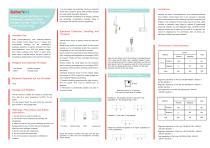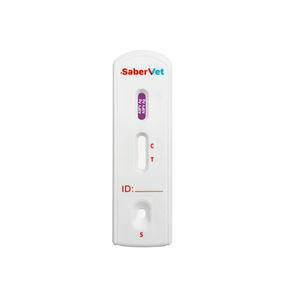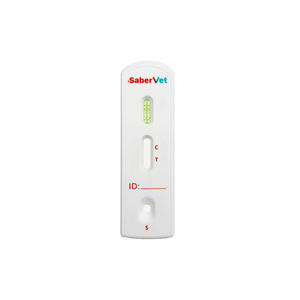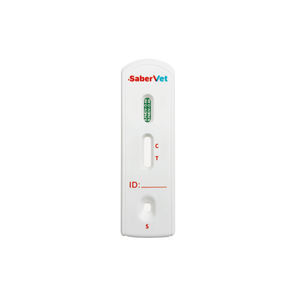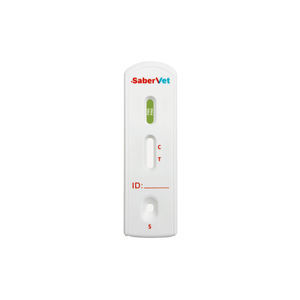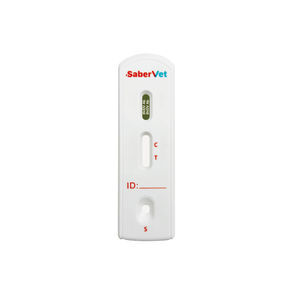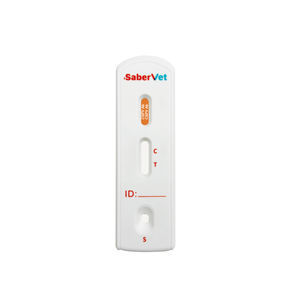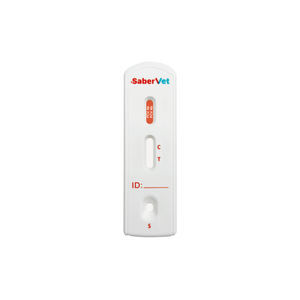
- Laboratory
- Laboratory medicine
- Rapid infectious disease test
- Hangzhou Antigenne Technology Co. Ltd
- Company
- Products
- Catalogs
- News & Trends
- Exhibitions
Rapid infectious disease test SaberVetveterinaryfor swinevirus
Add to favorites
Compare this product
fo_shop_gate_exact_title
Characteristics
- Applications
- for infectious diseases
- Application field
- veterinary
- Patient type
- for swine
- Micro-organism
- virus
- Sample type
- urine, blood, serum, plasma, saliva, breath
- Analysis mode
- immunoassay, lateral flow
- Format
- cassette
Description
The Sabervet African Swine Fever Virus Antibody Rapid Test is a lateral flow immunoassay intended for the qualitative detection of specific antibody from african swine fever virus (ASFV) in serum or plasma sample. The test is useful for determination of ASFV infection.
Description
African swine fever virus is a highly contagious and lethal virus that infects mainly domestic and wild pigs and poses a major threat to the global pig industry.
Clinical symptoms
Clinical signs of African swine fever vary depending on the acute, subacute and chronic forms of infection:
Acute form:
Hyperthermia: sudden rise in body temperature to 40-42°C.
Haemorrhagic signs: haemorrhagic spots appear on the skin, especially on the ears, abdomen and ends of the limbs.
Anorexia: marked loss of appetite.
Dyspnoea: accompanied by coughing and shortness of breath.
Vomiting and diarrhoea: bloody stools may occur.
Death: usually occurs within 7-10 days of infection and is up to 90-100% lethal.
Subacute type
Moderate fever: slightly elevated body temperature.
Decreased appetite: sometimes accompanied by mild respiratory symptoms.
Mild haemorrhagic symptoms: bleeding from skin and internal organs.
Mortality is low: usually 30-70%.
Chronic type
Intermittent fever.
Growth retardation and wasting.
Skin ulceration and necrosis.
Arthritis: lameness may occur.
Mortality is low: but growth and productivity are markedly affected.
Routes of transmission
Direct contact
Pig-to-pig transmission: by direct contact with body fluids (blood, saliva, urine, faeces, etc.) of infected pigs.
Feral pigs: feral pigs act as virus hosts and can be transmitted to domestic pigs through contact.
Exhibitions
Meet this supplier at the following exhibition(s):

Other Hangzhou Antigenne Technology Co. Ltd products
Livestock
Related Searches
- Blood rapid diagnostic test
- Rapid lateral flow test
- Immunoassay rapid diagnostic test
- Cassette rapid diagnostic test
- Virus rapid diagnostic test
- Serum rapid diagnostic test
- Plasma rapid diagnostic test
- Infectious disease rapid diagnostic test
- Whole blood rapid diagnostic test
- Rapid respiratory infection test
- Urine rapid screening test
- Bacteria rapid diagnostic test
- Rapid feces test
- Clinical rapid diagnostic test
- Nasal rapid diagnostic test
- Obstetrical/gynecological rapid test
- Rapid oral flu test
- Dog rapid test
- Coronavirus rapid diagnostic test
- Laboratory rapid diagnostic test
*Prices are pre-tax. They exclude delivery charges and customs duties and do not include additional charges for installation or activation options. Prices are indicative only and may vary by country, with changes to the cost of raw materials and exchange rates.


